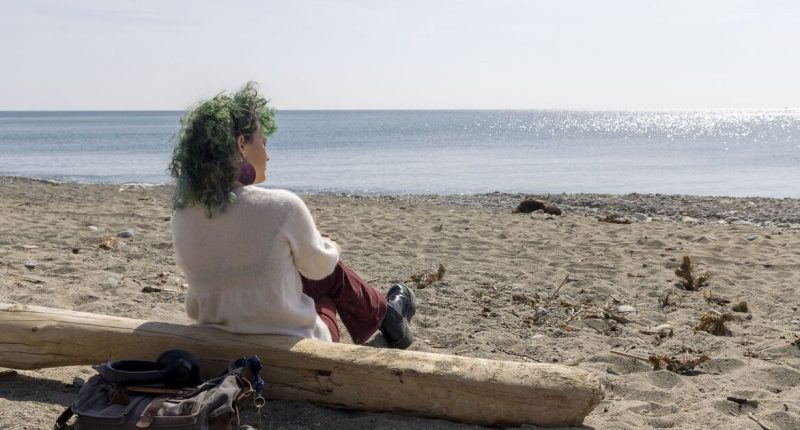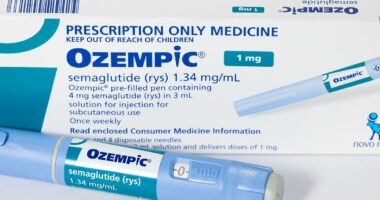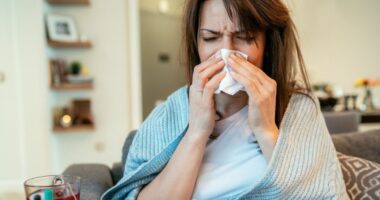Share this @internewscast.com
Over the Easter holidays many have seized the opportunity to escape abroad for a break from school and work. However, the fear of falling ill while on vacation looms large for some, with research indicating that over a quarter of holidaymakers are clueless about what to do if sickness strikes.
A staggering 60% express concern about the prospect of illness in a foreign land. Public Health England’s report suggests that between 20-30 per cent of travellers experience some form of sickness upon returning home, with respiratory infections topping the list.
Plus, stomach upsets and diarrhoea are frequent unwelcome travel companions, often due to contaminated food or water, exposure to unfamiliar bacteria, and the stress of dietary changes. The last thing anyone wants is to be confined to their hotel room, desperately seeking painkillers or tissues.
Thankfully, doctors Méabh and Danny, a couple who also happen to be seasoned travellers, have come forward with advice on avoiding holiday ailments. The Australian pair, who boast an impressive record of visiting 41 countries without succumbing to sickness, live in a van and document their health and travel tips on Instagram under the handle @celtsontheroad.
They shared: “If you travel or speak to any travellers for a lengthy period of time then the topic of travellers diarrhoea will no doubt come up.”
They added: “You’ll hear horror stories of travellers trying new foods only to spend the next week feverish and exploding out of both ends. Usually this story will be accompanied by advice like ‘avoid local food and only eat in western-style places’, ‘only eat in your hotel’, ‘avoid ice’, ‘avoid salads’, avoid meat and fish.”
However, they pointed out: “We’re both doctors and we’ve travelled to over 41 countries combined, we eat local food everywhere we go, and we rarely get sick.”
The doctor duo shared their secret to staying healthy while travelling – adherence to four crucial rules. Their guidance encourages travellers to enjoy the culinary delights each place has to offer. They suggested:
- Trust the locals and ideally look for somewhere busy
- Wash your hands before every meal
- Don’t touch your phone/ cash until after you’ve finished eating
- Carry some antibacterial gel just in case you can’t wash your hands
They reassured their audience, saying: “Enjoying different foods is one of the absolute best things about travelling. Don’t be frightened by some old wives tales. Wash your hands, eat local and savour the experiences!”
Providing a note of caution, they added: “There’s always the risk of getting unlucky with unhygienically prepared food but this is a risk at home as well as abroad. Also, there are obviously loads of other ways you can get sick. Before you take a trip it’s worthwhile seeing a health professional to see if there’s anything else needed for your trip eg vaccines.”
The advice was met with positivity and gratitude from their followers, with many confirming the effectiveness of these suggestions. A follower testified: “I do the same! Also I eat in crowded places and I take probiotics just in case – I have sensitive intestine – and guess what. I have never been sick before.”
One individual highlighted the importance of personal cleanliness, stating: “Hand hygiene….very underrated topic. It doesn’t matter how hygienic the restaurant is…your own hygiene is extremely important.”
Ahead of holiday travel, the UK Health Security Agency (UKHSA) recommends that individuals research health risks, check vaccination requirements, monitor their food and drink intake, stay cautious of heat exposure, and guard against mosquito bites.
For details on particular health risks and suggested vaccinations, the TravelHealthPro website offers country-specific guidance, as does the GOV.UK site for foreign travel advice.
Securing health insurance before travelling internationally is also critical to avoid costly fees for unexpected medical treatments.
In case of health concerns after returning from travel abroad, the NHS website provides resources for assistance or you can consult your GP for more information.















